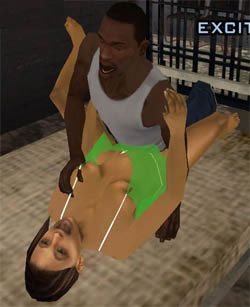
Moderators: Elvis, DrVolin, Jeff
Simulist wrote:Brekin wrote:I think it was Plato who said the best society would be one in which we were perpetually involved in playing games…
Whoever said that, I'm all for it — just so long as it's our own games we're choosing to play, and not someone else's we're coerced into playing.
Searcher08 wrote:Simulist wrote:Brekin wrote:I think it was Plato who said the best society would be one in which we were perpetually involved in playing games…
Whoever said that, I'm all for it — just so long as it's our own games we're choosing to play, and not someone else's we're coerced into playing.
The Master Game
Seek, above all, for a game worth playing. Such is the advice of the oracle to modern man. Having found the game, play it with intensity — play as if your life and sanity depend on it. (They do depend on it.) Follow the example of the French existentialists and flourish a banner bearing the word “engagement.” Though nothing means anything and all roads are marked “NO EXIT,” yet move as if your movements had some purpose. If life does not seem to offer a game worth playing, then invent one. For it must be clear, even to the most clouded intelligence, that any game is better than no game.
Robert S. deRopp
http://www.livereal.com/spiritual_arena ... r_game.htm
The Master Game
Seek, above all, for a game worth playing. Such is the advice of the oracle to modern man. Having found the game, play it with intensity — play as if your life and sanity depend on it. (They do depend on it.) Follow the example of the French existentialists and flourish a banner bearing the word “engagement.” Though nothing means anything and all roads are marked “NO EXIT,” yet move as if your movements had some purpose. If life does not seem to offer a game worth playing, then invent one. For it must be clear, even to the most clouded intelligence, that any game is better than no game.
Robert S. deRopp
The Glass Bead Game takes place at an unspecified date, centuries into the future. Hesse suggested that he imagined the book's narrator writing around the start of the 25th century.[2] The setting is a fictional province of central Europe called Castalia, reserved by political decision for the life of the mind; technology and economic life are kept to a strict minimum. Castalia is home to an austere order of intellectuals with a twofold mission: to run boarding schools for boys, and to nurture and play the Glass Bead Game, whose exact nature remains elusive and whose devotees occupy a special school within Castalia known as Waldzell. The rules of the game are only alluded to, and are so sophisticated that they are not easy to imagine. Playing the game well requires years of hard study of music, mathematics, and cultural history. Essentially the game is an abstract synthesis of all arts and sciences. It proceeds by players making deep connections between seemingly unrelated topics.
http://en.wikipedia.org/wiki/The_Glass_Bead_Game
In the game, players use a slingshot to launch birds at pigs stationed on or within various structures, with the intent of destroying all the pigs on the playfield. As players advance through the game, new birds appear, some with special abilities that can be activated by the player.
http://en.wikipedia.org/wiki/Angry_birds
brekin wrote:hanshan wrote:The Master Game
Seek, above all, for a game worth playing. Such is the advice of the oracle to modern man. Having found the game, play it with intensity — play as if your life and sanity depend on it. (They do depend on it.) Follow the example of the French existentialists and flourish a banner bearing the word “engagement.” Though nothing means anything and all roads are marked “NO EXIT,” yet move as if your movements had some purpose. If life does not seem to offer a game worth playing, then invent one. For it must be clear, even to the most clouded intelligence, that any game is better than no game.
Robert S. deRopp
Agreed. I just don't think that this:The Glass Bead Game takes place at an unspecified date, centuries into the future. Hesse suggested that he imagined the book's narrator writing around the start of the 25th century.[2] The setting is a fictional province of central Europe called Castalia, reserved by political decision for the life of the mind; technology and economic life are kept to a strict minimum. Castalia is home to an austere order of intellectuals with a twofold mission: to run boarding schools for boys, and to nurture and play the Glass Bead Game, whose exact nature remains elusive and whose devotees occupy a special school within Castalia known as Waldzell. The rules of the game are only alluded to, and are so sophisticated that they are not easy to imagine. Playing the game well requires years of hard study of music, mathematics, and cultural history. Essentially the game is an abstract synthesis of all arts and sciences. It proceeds by players making deep connections between seemingly unrelated topics.
http://en.wikipedia.org/wiki/The_Glass_Bead_Game
Has a level dealing with this:In the game, players use a slingshot to launch birds at pigs stationed on or within various structures, with the intent of destroying all the pigs on the playfield. As players advance through the game, new birds appear, some with special abilities that can be activated by the player.
http://en.wikipedia.org/wiki/Angry_birds
Most of these responses surprise me a little. Of course it's cool to play, to relax, to have fun. But aren't people on the board constantly complaining about the widespread passivity and alienation of the culture? That as governments lie, ecosystems die, and humans around the planet suffer, we're transfixed by our electronic diversions and can't be bothered with any of it?
Is it really so awful that we occasionally consider and reconsider our most hollow habits?





Maybe the meeting point of the two worlds is alluded to by Hesse in this poem, from The Glass Bead Game -

















elephant wrote:Most of these responses surprise me a little. Of course it's cool to play, to relax, to have fun. But aren't people on the board constantly complaining about the widespread passivity and alienation of the culture? That as governments lie, ecosystems die, and humans around the planet suffer, we're transfixed by our electronic diversions and can't be bothered with any of it?
Is it really so awful that we occasionally consider and reconsider our most hollow habits?
elephant wrote:Most of these responses surprise me a little. Of course it's cool to play, to relax, to have fun. But aren't people on the board constantly complaining about the widespread passivity and alienation of the culture? That as governments lie, ecosystems die, and humans around the planet suffer, we're transfixed by our electronic diversions and can't be bothered with any of it?
Is it really so awful that we occasionally consider and reconsider our most hollow habits?
Just imagine what we could have accomplished if that time was spent productively.
a gala event held at the Finnish Presidential Palace








Users browsing this forum: No registered users and 5 guests